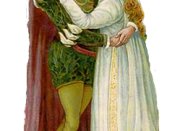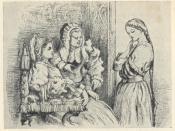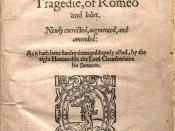An analysis of William Shakespeare's "Romeo and Juliet" Act I, Scene V
Act 1 scene 5 is set at the Capulet's House on the night of the Capulet family ball. It is an important scene in the play because it is the first time when Romeo and Juliet meet and realise their love for one another.
In the play leading up to this scene we find out that the play is set in Verona and about the feud between the Capulets and the Montagues. We learn of Romeo's love for Rosaline and his melancholy mood after she rejects his advances.
Romeo's cousin, Benvolio tries to take Romeo's mind off Rosaline and suggests finding a new woman. When an illiterate Capulet Servant comes and needs help to read an invitation to the Capulet Ball it becomes apparent to Benvolio that this will be the perfect chance for Romeo to find someone new.
(Benvolio Act I, Scene II "Go thither and with unattainted eye compare her face with some that I shall show and I will make thee think thy swan a crow" (referring to Rosaline)).
We also learn that Juliet has been requested by Paris to be his wife and they have plans to meet at the Capulet Ball. This shows Shakespeare's intentions that the play be about fate, how Romeo just happened to come across an illiterate servant delivering the invites and how it was that party that Paris decides to introduce himself to Juliet.
The scene starts with servants and the hosts preparing the house for the Capulet ball. Everything is rushed and the speech is kept to a minimum. After this part in the scene the guests start to arrive and Lord Capulet makes his opening speech to the guests:
"Welcome, gentlemen! Ladies that have their toes
Unplagued with corns will have a bout with you.
Ah ha, my mistresses! Which of you all
Will now deny to dance? She that makes dainty,
She, I'll swear, hath corns; am I come near ye now?
This speech asks all the ladies and gentlemen present to get up and dance with their ladies and if the ladies do not dance then they must have bad feet. He then goes on to welcome Romeo and the other masked Montagues:
"Welcome, gentlemen! I have seen the day
That I have worn a visor and could tell
A whispering tale in a fair lady's ear,
Such as would please: 'tis gone, 'tis gone, 'tis gone:".
Masked balls were a custom of the time, it gave uninvited guests such as Romeo and Benvolio a chance to be anonymous, this shows Lord Monatgue's mood as happy and joyful as he telling them the times when he used to wear a mask and tempt young ladies.
After this speech, Romeo is browsing the dance floor and taking Benvolio's advice to find himself another woman, when he comes across Juliet dancing with Paris. Romeo starts to talk about Juliet:
"O she doth teach the torches to burn bright!
It seems she hangs upon the cheek of night"
This shows how Romeo feels Juliet shines brighter than torches, stands out in a crowd.
"As a rich jewel in an Ethiop's ear-
Beauty too rich for use, for earth too dear:
Romeo is stating that Juliet stands out like a shining jewel against the darkened, crowded background and that she is too precious to be on this earth implying she could be angel like.
"So shows snowy dove trooping with crows"
Going back to Benvolio's speech in scene II. This part which Romeo has said, "So shows snowy dove trooping with crows," implies Romeo believes he has found the one which Benvolio was intending, this is also tying in with the theme of fate. A few lines on Romeo has forgotten his love for Rosaline when he says:
"Did my heart love till now? Forswear it, sight!
For I never saw true beauty till this night."
This speech shows Romeo's mood as happy and full of love as he begins to talk in rhyming couplets, this changes the mood of the scene from the beginning, from the short speech of the servants to Romeo's long poetic speeches.
After Romeo's speech, Tybalt (Lady Capulet's nephew) enters the room. He notices Romeo and catches upon his voice, he says:
"This by the voice, should be a Montague.
Fetch me my Rapier boy.
What dares the slave
Come hither, cover'd with an antic (comical/funny) face"
We already know that Tybalt is highly aggressive from his comments in act I scene I when he states "peace, I hate the word". This shows his mood as Choler, he wants Romeo out of the house by any means necessary.
Lord Capulet tries to calm Tybalt and persuade him not to fight with Romeo, he says:
"Content thee, gentle coz, let him alone;
He bears him like a portly gentleman;
And, to say truth, Verona brags of him
To be a virtuous and well-govern'd youth:
I would not for the wealth of all the town
Here in my house do him disparagement:
Therefore be patient, take no note of him:
It is my will, the which if thou respect,
Show a fair presence and put off these frowns,
And ill-beseeming semblance for a feast."
In this caption Lord Capulet tells Tybalt that Romeo is a well-mannered and dignified young boy who causes no trouble and that he would not see any harm come to him in his house. He also tells Tybalt he doesn't want his party ruined: "you'll make a mutiny among my guests." It is known from previous scenes that Tybalt is very proud of the house of Capulet, he shows his mood as choler and bitter towards Romeo.
"I will withdraw, but this intrusion shall,
Now seeming sweet, convert to bitt'rest gall.
This is a key part to what happens next in the play between Romeo and Tybalt. It is also a warning that not all will be as well as it is going for Romeo in this scene.
After all the commotion between Lord Capulet and Tybalt comes a change in the mood of the scene. From now until the end of the scene is a love swept mood, using poetry. The poetry is from line 92 to 106 and is written in the form of a Shakespearean sonnet. Sonnets were used to capture peoples attention as important text in the play, Shakespearean sonnets have 14 lines and are written in and iambic pentameter with the rhyming scheme ABAB CDCD EFEF GG.
Romeo takes Juliet's hand and says:
"If I profane with my unworthiest hand
This holy shrine, the gentle sin is this:
My lips, two blushing pilgrims, ready stand
To smooth that rough touch with a tender kiss."
Romeo has introduced a religious theme to the play by making references to shrines and pilgrims. He also mentions his sin, by taking Juliet by the hand and asking her for a kiss. Juliet then replies to Romeo:
"Good pilgrim, you do wrong your hand too much,
Which mannerly devotion shows in this;
For saints have hands that pilgrims' hands do touch,
And palm to palm is holy palmers' kiss.
She answers Romeo and tells him she is not offended or upset by his sin, infact she is honoured that Romeo is referring to pilgrims because a pilgrim shows the most devotion by travelling far and wide to reach a shrine. This shows Juliet Romeo's devotion and love for her. She carries on the religions theme with her talk of Saints and holy palmers, she also says that saints touch Pilgrims hands to show love saying that a touch is just as important as a kiss. Romeo says in answer to Juliet's comment:
"Have not saints lips, and holy palmers too?"
Romeo is trying to get a kiss from Juliet but she manages to answer his question, avoiding the kiss:
"Ay, pilgrim lips that they must use in prayer"
Romeo finally manages to get round Juliet by getting straight to the point and asking;
"O then, dear saint, let lips do what hands do.
They pray, grant thou, lest faith turn to despair."
Romeo is trying to imply that Juliet is like a saint and himself the pilgrim, to this Juliet replies,
"Saints do not move, though grant for prayers sake."
Juliet says, "saints do not move", as they can only be seen as figures or statues on earth, this tells Romeo that if she shall not move, he must make the first move, so Romeo replies:
"Then move not while my prayers effect I take.
Thus from my lips, by thine, my sin is purged."
This tells her to literally stand still while he takes his prayers effect (the kiss) and purifies him self from his previous sin of taking her hand.
After the kiss, the sonnet ends but some rhyme still carries on as Juliet says:
"Then have my lips the sin that they have took."
Telling Romeo the kiss needs to be returned to return Romeo's sin on her. Romeo says:
"Sin from my lips? O trespass sweetly urg'd!
Give me my sin again."
**They kiss again.**
Their kiss is suddenly interrupted by Juliet's Nurse, who has come to find Juliet to tell her, her mother needs to see her.
While Juliet is gone to find her mother, Romeo has a chance to find out whom he has just met. He asks nurse, who tells him she is a Capulet and daughter of Lady Capulet. Romeo is shocked, he says:
"Is she a Capulet?
O dear account! My life is my foe's debt!"
Romeo now knows his love is a Capulet and that his future love life depends on them. Romeo and Benvolio think it is time to leave as the best of the Ball is over and the longer they stay the more unrest they cause.
As Romeo is leaving with the other guests Juliet takes her chance to find out the identity of her lover, she asks nurse the identity of a few of the leaving guests then asks nurse of the identity of Romeo. She does not know of him and sends forth someone to inquire, Juliet adds:
"if he be married,
My grave is likely to be my wedding bed"
This meaning that if Romeo is not the one she may marry then she will die unmarried. It is also following on the theme of fate and how she almost predicts her fate without knowing it. Nurse returns with the news that Romeo is a Montague, she is also shocked, like Romeo to find out that she loves a Monatgue, she shows this by saying:
"My only love sprung from my only hate!
Too early seen unknown and known too late!
Prodigious birth of love is known to me
That I must love a loathed enemy."
Juliet regrets seeing Romeo because now she is in love and he is an unattainable target. She is just upset it is too late and there is nothing she can do. She begins to feel melancholy. Nurse comes in and is confused by Juliet. Juliet tells nurse it is ok and it was just a rhyme she had learned from someone she had been dancing with. A voice calls from off stage and Juliet leaves. End of Scene.
The chorus comes onto stage to refresh the audience of the scene. The chorus is also written in rhyme, using the same as rhyme scheme and rhythm as before.
This was a very dramatic and important Scene as it is the first meeting point of Romeo and Juliet it is also the place they realise that their love will never be. This scene is the place where Tybalt swears his revenge on Romeo, a key part to the ending and the plot to the rest of the play. This scene is written beautifully with the use of sonnets and poetry throughout. The scene has extreme mood swings and changes of ambience e.g. from the bustling of the ball and shouting of Tybalt straight into the soft and beautiful poetry when Romeo takes Juliet's hand.


